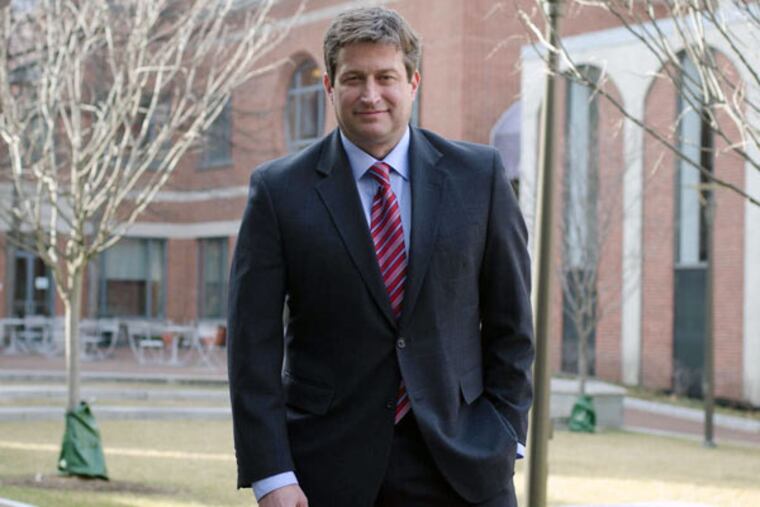New Penn law school dean has grip on complexity
More than most, Ted Ruger understands legal complexity. And a good thing, too. The former Supreme Court law clerk is set to take over as dean of the University of Pennsylvania law school July 1. Penn, along with a handful of other elite U.S. law schools, brands itself as a training ground for top students who learn to grapple with the most difficult legal problems.

More than most, Ted Ruger understands legal complexity.
And a good thing, too. The former Supreme Court law clerk is set to take over as dean of the University of Pennsylvania law school July 1. Penn, along with a handful of other elite U.S. law schools, brands itself as a training ground for top students who learn to grapple with the most difficult legal problems.
That's why so many of the highest-paying law firms want to hire them, even in a job market that still is struggling.
Ruger, a graduate of Harvard University law school and Williams College, says he only began to grasp how devilishly complex the toughest legal issues can be as a clerk for Justice Stephen G. Breyer. "The Supreme Court typically only takes cases where the lower courts have decided differently," says Ruger, 46, who lives in East Falls with his wife, Jennifer Prah Ruger, and their three children. "There is a real bias there to take only the most difficult and ambiguous cases."
As incoming dean, Ruger wants to increase the law school's impact on Washington and state capital policy debates, with more research on subjects ranging from health care to tax policy.
Ruger is now a deputy dean at the law school and has spent the last decade on the faculty, after stints at the Washington University law school, two federal court clerk positions, and in private practice.
He's concentrated much energy on health-care law, an interest that tracks closely with that of his wife, a health economist at Penn's Perelman School of Medicine. She's also a former tennis pro who was once ranked 180th on the pro tour.
Ruger is pleased that the Supreme Court has so far upheld the Affordable Care Act. He wrote with Ezekiel J. Emanuel, the former White House adviser who now serves as a vice provost at Penn, that the decision marked a "great day" for U.S. health care in an op-ed piece in the New York Times. But he says the law didn't do enough to streamline health-care delivery and control costs.
At Harvard Law School, Ruger, who describes himself as a constitutional progressive, regularly debated Ted Cruz, now a Texas senator and conservative firebrand, and played basketball with him.
"I like to think that our legal skills far exceeded our mediocre basketball skills," Ruger said.
In September, he was paired with New York University law professor Richard Epstein, a noted conservative theorist, in a program at the National Constitution Center that focused on Epstein's book arguing for limited federal power. Ruger said there was a legal basis for greater federal authority.
"There are certain people I will not debate," Epstein said. "One of the nice things about Ted is that there is never so much intellectual distance that you can't have a good conversation."
Ruger is also well liked among Penn faculty, where his easygoing demeanor has won him many friends. "He has always stood out as someone who has good judgment and is brilliant, but also as a wonderful person," said Stephanos Bibas, professor of law and criminology at Penn. "The backstory is there is no backstory."
Ruger will take over as dean at a time of good fortune for the law school. U.S. News and World Report ranks it seventh nationally behind, in ascending order, New York University, the University of Chicago, Columbia University, Stanford, Harvard, and Yale.
And in a time of tight legal hiring, the job market for Penn graduates has been favorable. The median salary for graduates starting their first jobs in 2013 was $160,000.
What's more, median salaries are little changed since 2007, the height of the last law firm hiring boom. Since then, many firms have not only cut back on hiring, but also reduced pay for first-year associates.
Ruger, who succeeds former dean Michael Fitts - he left last year to take over as Tulane University president - says the plans to broaden the school's impact on policy debates and recruit top policymakers to teach will raise the school's profile. And it will enhance the learning experience. Interim dean Wendell Pritchett has been leading the school since Fitts' departure.
"I think it is clear that the school is in good shape," Ruger said. "There are things we can do better. What is clear is that I am not content nor complacent. We realize that we cannot sit still."